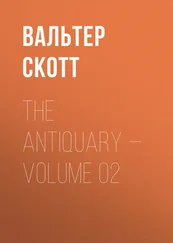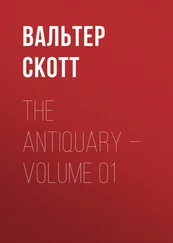Вальтер Скотт - Waverley Novels — Volume 12
Здесь есть возможность читать онлайн «Вальтер Скотт - Waverley Novels — Volume 12» — ознакомительный отрывок электронной книги совершенно бесплатно, а после прочтения отрывка купить полную версию. В некоторых случаях можно слушать аудио, скачать через торрент в формате fb2 и присутствует краткое содержание. Жанр: foreign_antique, foreign_prose, Альтернативная история, на английском языке. Описание произведения, (предисловие) а так же отзывы посетителей доступны на портале библиотеки ЛибКат.
- Название:Waverley Novels — Volume 12
- Автор:
- Жанр:
- Год:неизвестен
- ISBN:нет данных
- Рейтинг книги:5 / 5. Голосов: 1
-
Избранное:Добавить в избранное
- Отзывы:
-
Ваша оценка:
- 100
- 1
- 2
- 3
- 4
- 5
Waverley Novels — Volume 12: краткое содержание, описание и аннотация
Предлагаем к чтению аннотацию, описание, краткое содержание или предисловие (зависит от того, что написал сам автор книги «Waverley Novels — Volume 12»). Если вы не нашли необходимую информацию о книге — напишите в комментариях, мы постараемся отыскать её.
Waverley Novels — Volume 12 — читать онлайн ознакомительный отрывок
Ниже представлен текст книги, разбитый по страницам. Система сохранения места последней прочитанной страницы, позволяет с удобством читать онлайн бесплатно книгу «Waverley Novels — Volume 12», без необходимости каждый раз заново искать на чём Вы остановились. Поставьте закладку, и сможете в любой момент перейти на страницу, на которой закончили чтение.
Интервал:
Закладка:
"Mr. Cleishbotham, in the first place, these manuscripts, over which you claim a very doubtful right, were never given to any one by me, and must have been sent to America either by yourself, or by some one of the various gentlemen to whom, I am well aware, you have afforded opportunities of perusing my brother's MS. remains."
"Mr. Pattison," I replied, "I beg to remind you that it never could be my intention, either by my own hands, or through those of another, to remit these manuscripts to the press, until, by the alterations which I meditated, and which you yourself engaged to make, they were rendered fit for public perusal."
Mr. Pattison answered me with much heat: — "Sir, I would have you to know, that if I accepted your paltry offer, it was with less regard to its amount, than to the honour and literary fame of my late brother. I foresaw that if I declined it, you would not hesitate to throw the task into incapable hands, or, perhaps, have taken it upon yourself, the most unfit of all men to tamper with the works of departed genius, and that, God willing, I was determined to prevent — but the justice of Heaven has taken the matter into its own hands. Peter Pattison's last labours shall now go down to posterity unscathed by the scalping-knife of alteration, in the hands of a false friend — shame on the thought that the unnatural weapon could ever be wielded by the hand of a brother!"
I heard this speech not without a species of vertigo or dizziness in my head, which would probably have struck me lifeless at his feet, had not a thought like that of the old ballad —
"Earl Percy sees my fall," called to my recollection, that I should only afford an additional triumph by giving way to my feelings in the presence of Mr. Paul Pattison, who, I could not doubt, must be more or less directly at the bottom of the Transatlantic publication, and had in one way or another found his own interest in that nefarious transaction.
To get quit of his odious presence I bid him an unceremonious good-night, and marched down the glen with the air not of one who has parted with a friend, but who rather has shaken off an intrusive companion. On the road I pondered the whole matter over with an anxiety which did not in the smallest degree tend to relieve me. Had I felt adequate to the exertion, I might, of course, have supplanted this spurious edition (of which the literary gazettes are already doling out copious specimens) by introducing into a copy, to be instantly published at Edinburgh, adequate correction of the various inconsistencies and imperfections which have already been alluded to. I remember the easy victory of the real second part of these "Tales of my Landlord" over the performance sent forth by an interloper under the same title; and why should not the same triumph be repeated now? There would, in short, have been a pride of talent in this manner of avenging myself, which would have been justifiable in the case of an injured man; but the state of my health has for some time been such as to render any attempt of this nature in every way imprudent.
Under such circumstances, the last "Remains" of Peter Pattison must even be accepted, as they were left in his desk; and I humbly retire in the hope that, such as they are, they may receive the indulgence of those who have ever been but too merciful to the productions of his pen, and in all respects to the courteous reader's obliged servant, J. C.
GANDERCLEUCH, 15th Oct. 1831.
COUNT ROBERT OF PARIS
CHAPTER THE FIRST
Leontius . — That power that kindly spreads
The clouds, a signal of impending showers,
To warn the wandering linnet to the shade,
Beheld without concern expiring Greece,
And not one prodigy foretold our fate.
Demetrius . A thousand horrid prodigies foretold it:
A feeble government, eluded laws,
A factious populace, luxurious nobles,
And all the maladies of sinking states.
When public villany, too strong for justice,
Shows his bold front, the harbinger of ruin,
Can brave Leontius call for airy wonders,
Which cheats interpret, and which fools regard?
The close observers of vegetable nature have remarked, that when a new graft is taken from an aged tree, it possesses indeed in exterior form the appearance of a youthful shoot, but has in fact attained to the same state of maturity, or even decay, which has been reached by the parent stem. Hence, it is said, arises the general decline and death that about the same season is often observed to spread itself through individual trees of some particular species, all of which, deriving their vital powers from the parent stock, are therefore incapable of protracting their existence longer than it does.
In the same manner, efforts have been made by the mighty of the earth to transplant large cities, states, and communities, by one great and sudden exertion, expecting to secure to the new capital the wealth, the dignity, the magnificent decorations and unlimited extent of the ancient city, which they desire to renovate; while, at the same time, they hope to begin a new succession of ages from the date of the new structure, to last, they imagine, as long, and with as much fame, as its predecessor, which the founder hopes his new metropolis may replace in all its youthful glories. But nature has her laws, which seem to apply to the social, as well as the vegetable system. It appears to be a general rule, that what is to last long should be slowly matured and gradually improved, while every sudden effort, however gigantic, to bring about the speedy execution of a plan calculated to endure for ages, is doomed to exhibit symptoms of premature decay from its very commencement. Thus, in a beautiful Oriental tale, a dervise explains to the sultan how he had reared the magnificent trees among which they walked, by nursing their shoots from the seed; and the prince's pride is damped when he reflects, that those plantations, so simply raised, were gathering new vigour from each returning sun, while his own exhausted cedars, which had been transplanted by one violent effort, were drooping their majestic heads in the Valley of Orez. [Footnote: Tale of Mirglip the Persian, in the Tales of the Genii.]
It has been allowed, I believe, by all men of taste, many of whom have been late visitants of Constantinople, that if it were possible to survey the whole globe with a view to fixing a seat of universal empire, all who are capable of making such a choice, would give their preference to the city of Constantine, as including the great recommendations of beauty, wealth, security, and eminence. Yet with all these advantages of situation and climate, and with all the architectural splendour of its churches and halls, its quarries of marble, and its treasure-houses of gold, the imperial founder must himself have learned, that although he could employ all these rich materials in obedience to his own wish, it was the mind of man itself, those intellectual faculties refined by the ancients to the highest degree, which had produced the specimens of talent at which men paused and wondered, whether as subjects of art or of moral labour. The power of the Emperor might indeed strip other cities of their statues and their shrines, in order to decorate that which he had fixed upon as his new capital; but the men who had performed great actions, and those, almost equally esteemed, by whom such deeds were celebrated, in poetry, in painting, and in music, had ceased to exist. The nation, though still the most civilised in the world, had passed beyond that period of society, when the desire of fair fame is of itself the sole or chief motive for the labour of the historian or the poet, the painter or the statuary. The slavish and despotic constitution introduced into the empire, had long since entirely destroyed that public spirit which animated the free history of Rome, leaving nothing but feeble recollections, which produced no emulation.
Читать дальшеИнтервал:
Закладка:
Похожие книги на «Waverley Novels — Volume 12»
Представляем Вашему вниманию похожие книги на «Waverley Novels — Volume 12» списком для выбора. Мы отобрали схожую по названию и смыслу литературу в надежде предоставить читателям больше вариантов отыскать новые, интересные, ещё непрочитанные произведения.
Обсуждение, отзывы о книге «Waverley Novels — Volume 12» и просто собственные мнения читателей. Оставьте ваши комментарии, напишите, что Вы думаете о произведении, его смысле или главных героях. Укажите что конкретно понравилось, а что нет, и почему Вы так считаете.












